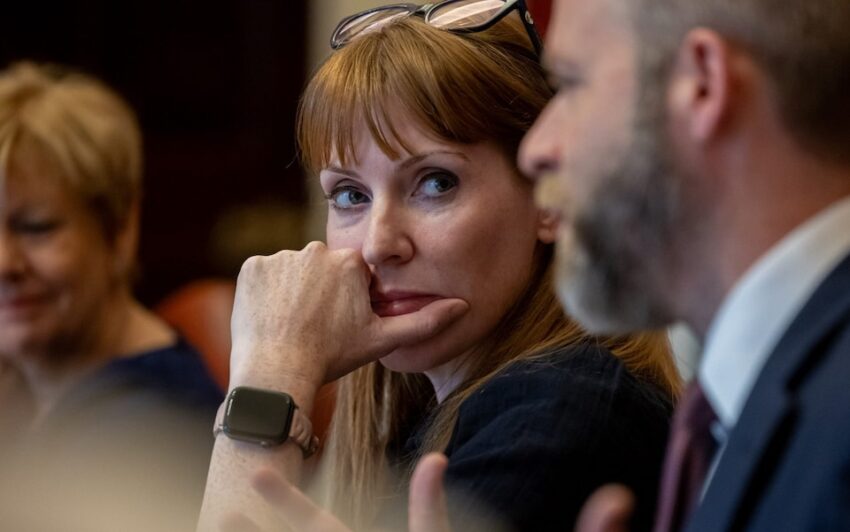Receive free Guatemala updates
We’ll send you a myFT Daily Digest email rounding up the latest Guatemala news every morning.
A centre-left anti-corruption outsider has won Guatemala’s presidential race, with voters in Central America’s largest economy becoming the latest in the region to reject the political establishment over a failure to tackle graft.
Bernardo Arévalo, a former diplomat, beat former first lady Sandra Torres, securing 58 per cent of the vote compared with 37 per cent for Torres after all ballots were counted on Monday, according to the Supreme Electoral Tribunal.
“This victory is for the people of Guatemala and now united . . . we will fight against corruption,” Arévalo said late on Sunday after the vote. He described the vote as a referendum on the country’s fragile democracy, with Guatemalans now braced for a tense transition and possible efforts to block him from taking office or governing effectively.
Arévalo, 64, shocked Guatemala’s conservative political class by finishing second in the first round of voting in June, a result that secured him a spot against Torres in the run-off.
That spurred a torrent of legal challenges, in what rights groups and foreign governments saw as an attempt to interfere with the election. The ruling party and its allies disputed the first-round result and prosecutors opened several legal cases against Arévalo’s Movimiento Semilla (Seed Movement) party.
“Most Guatemalans are fed up with a broken political class,” said Will Freeman, a Latin America fellow at the Council on Foreign Relations. “The distinguishing thing about Arévalo is not that he’s moderate, radical, centre-left, left . . . its actually that he’s just an outsider and that he and his party have not built alliances with any of these other tainted factions.”
Outgoing conservative president Alejandro Giammattei congratulated Arévalo on Sunday and invited him to start an orderly transition once the results were finalised. But Torres’ National Unity of Hope party said it would not accept the results until they were scrutinised transparently, raising objections to the process.
Guatemalan voters were attracted to the social democrat’s anti-corruption message. Arévalo’s party grew out of widespread protests in 2015, known as the “Guatemalan spring”, over political corruption exposed by the UN-backed investigative body Cicig. The government abruptly shut the body in 2019.
Dozens of former prosecutors, judges and reporters have fled the country or been imprisoned, including acclaimed investigative journalist José Rubén Zamora. The attorney-general is under US sanctions for corruption.
The son of a popular former president, Arévalo has promised to create a National Anti-Corruption System, a more meritocratic civil service and to digitise public services. He also said he would reduce tax evasion and consider public-private infrastructure partnerships.
Despite his popular mandate and messages of congratulations from the Organisation of American States and the EU, Arévalo will face an uphill battle in governing, analysts said. His party will only have 23 of the 160 seats in Congress, forcing it to forge alliances or a coalition to pass legislation. Prosecutors are also pursuing a legal case against the party that, if successful, could lead to its members being barred from holding certain positions in the legislature.
“It’s likely we will have new challenges or questioning of the election results,” said Eduardo Nuñez, director of the National Democratic Institute in Guatemala. Whether Arévalo can secure support from social movements and the private sector will prove critical, added Nuñez.
Guatemala’s gross domestic product is expected to grow 3.2 per cent this year, according to UN projections. Highly conservative fiscal management means its stock of public debt is less than 30 per cent of GDP, though foreign investment has languished below 2 per cent.
Juan Carlos Zapata, director of private sector-linked think-tank Fundesa, said the next government should focus on attracting investment by resolving bottlenecks in infrastructure, skills and the rule of law.
Siobhan Morden, managing director of Latin America fixed-income strategy at Santander, said Arévalo would now be likely to focus on building an economic team, possibly including technocrats from the private sector.
“The Semilla party should know full well that collaboration is the only viable strategy to improve weak governability,” Morden said in a note.
#Anticorruption #candidate #wins #Guatemala #presidency #landslide







